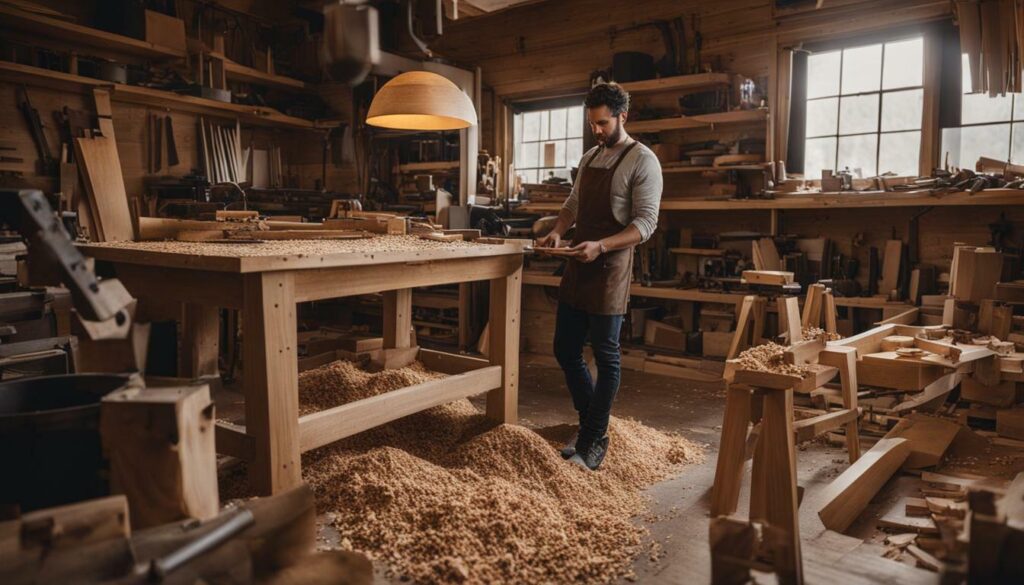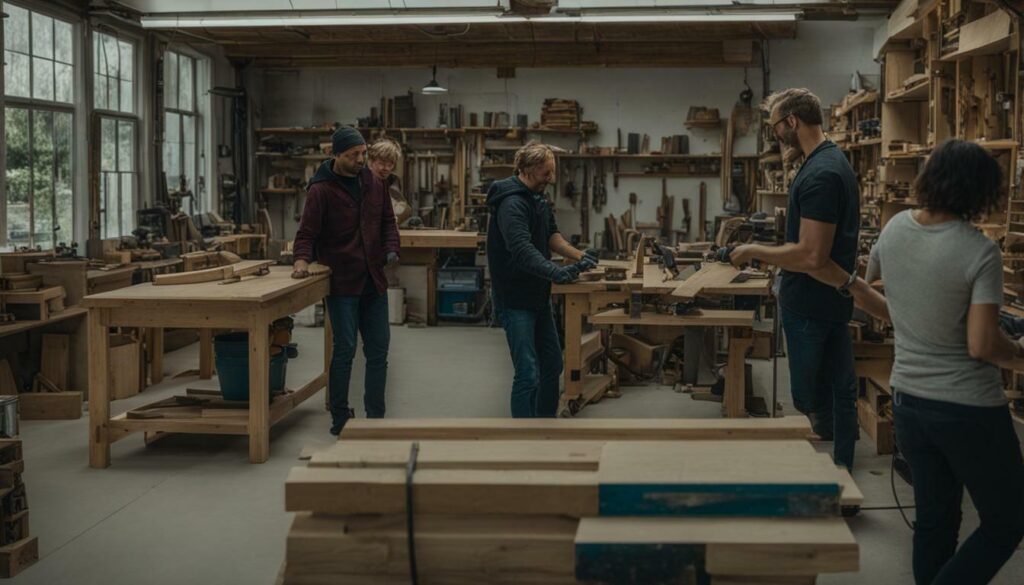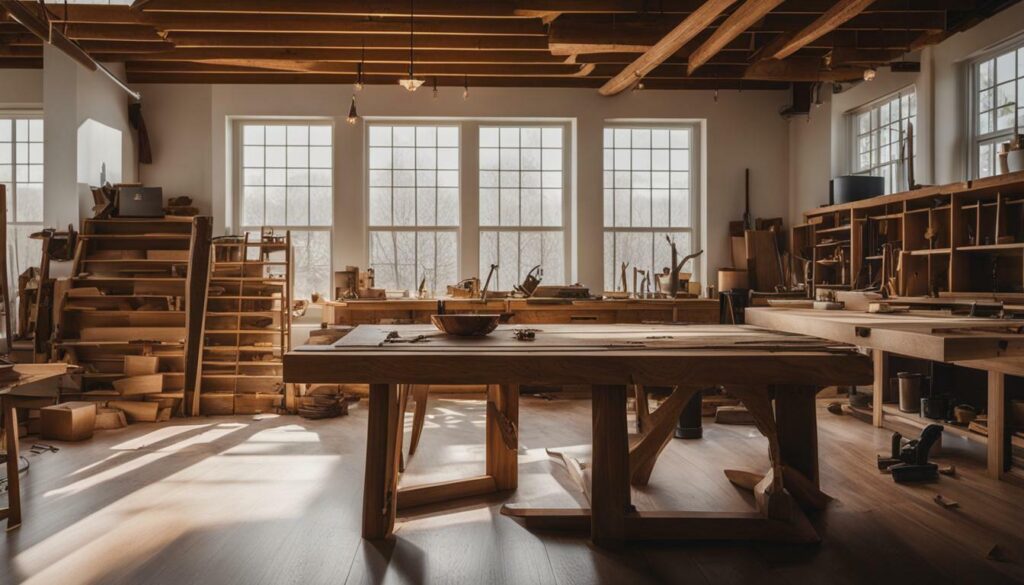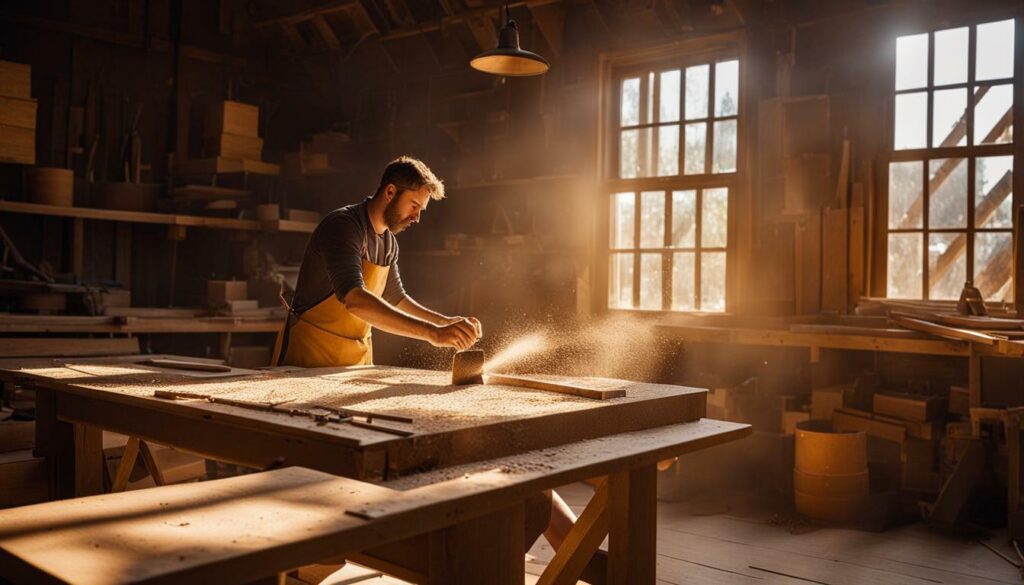Woodworking has become increasingly popular in recent years, offering both physical and mental benefits to those who engage in this fulfilling activity. It is a creative and engaging hobby that can enhance your overall well-being and contribute to a healthier mind. Whether you are a professional woodworker or someone who simply enjoys woodworking as a hobby, there are numerous psychological benefits to be gained from this craft. Let’s delve into the various ways in which woodworking can positively impact your mental health and well-being.
Key Takeaways:
- Woodworking provides physical benefits such as improved hand-eye coordination, dexterity, and muscle strength
- Engaging in woodworking promotes mindfulness, relaxation, and a sense of focus and concentration
- Woodworking offers a creative outlet for self-expression and imagination
- It can be particularly beneficial for individuals struggling with depression, providing a sense of purpose and accomplishment
- Woodworking promotes social connections and community building, as individuals often join clubs and workshops to share their passion
Improving Mental Well-being with Woodworking
Engaging in woodworking can have a significant positive impact on your emotional well-being and overall mental health. This popular hobby combines the benefits of physical activity, mindfulness, and creative expression, making it a valuable tool for enhancing your mental well-being.
Woodworking provides a sense of focus and concentration, allowing you to enter a state of mindfulness and relaxation. As you work with the wood, your mind becomes fully engaged in the task at hand, helping to alleviate stress and anxiety. The repetitive motions involved in woodworking can also have a calming effect on your mind and body, similar to the therapeutic benefits of activities like knitting or coloring.
Not only does woodworking promote relaxation, but it also serves as a creative outlet. It allows you to express yourself and explore your imagination through the creation of unique and personalized pieces. Whether you’re building furniture, crafting intricate woodwork designs, or simply carving small decorative items, woodworking offers endless opportunities for self-expression and accomplishment.
For individuals struggling with depression or low mood, woodworking can provide a sense of purpose and achievement. The process of transforming a piece of raw wood into a finished product can boost self-esteem and instill a sense of pride. Additionally, woodworking often brings people together, fostering social connections and a sense of community. Joining woodworking clubs or workshops allows you to share your passion with like-minded individuals, exchange ideas, and learn from one another.
| Woodworking Benefits for Mental Well-being: |
|---|
| Enhances focus and concentration |
| Reduces stress and anxiety |
| Promotes mindfulness and relaxation |
| Boosts self-esteem and a sense of accomplishment |
| Fosters social connections and community building |

- Start with small projects: Begin your woodworking journey with manageable projects to build confidence and avoid feeling overwhelmed.
- Create a dedicated space: Designate a specific area in your home or garage for woodworking, providing you with a dedicated space to focus on your craft.
- Practice safety precautions: Prioritize safety by wearing protective gear such as goggles, gloves, and a dust mask to prevent injuries and minimize exposure to wood dust.
- Experiment with different techniques: Explore various woodworking techniques, such as carving, joinery, or woodturning, to broaden your skills and keep the process exciting and diverse.
- Seek guidance and inspiration: Attend woodworking classes, workshops, or online forums to learn from experienced woodworkers and gain inspiration from their projects.
Incorporating woodworking into your life can provide not only a fulfilling hobby but also a practical way to improve your mental well-being. So, grab your tools, unleash your creativity, and let woodworking become your personal gateway to relaxation, self-expression, and a healthier mind.
Fostering Creativity and Self-expression
Woodworking allows individuals to tap into their creative side, fostering self-expression and providing a sense of accomplishment that can boost self-esteem. Through the process of working with wood, you have the opportunity to bring your unique ideas to life, creating tangible objects that reflect your personal style and vision. Whether you are crafting a small wooden figurine, designing a custom piece of furniture, or carving intricate patterns, woodworking allows you to express yourself in a truly artistic way.
One of the cognitive benefits of woodworking is the stimulation of the brain. Engaging in woodworking tasks, such as measuring, cutting, and assembling, requires problem-solving skills and critical thinking. As you navigate through the various steps of a woodworking project, you are constantly challenging your mind and expanding your cognitive abilities. This mental stimulation can have a positive impact on overall brain health and function.
In addition to boosting creativity and cognitive function, woodworking offers a sense of satisfaction and accomplishment. Completing a woodworking project, whether it’s a simple beginner’s piece or a complex masterpiece, gives you a tangible result of your hard work. This sense of achievement can greatly enhance self-esteem and boost your confidence in your abilities. It provides a fulfilling sense of purpose and pride in your craftsmanship.

In summary, woodworking is a powerful medium for fostering creativity and self-expression. It allows individuals to explore their imagination, create unique and personalized objects, and experience a sense of accomplishment that can boost self-esteem. Additionally, woodworking stimulates cognitive function, providing mental challenges that promote brain health. Whether you are a seasoned woodworker or just starting out, embracing the art of woodworking can bring immense joy, satisfaction, and a deeper connection with your own creativity.
Woodworking as a Therapeutic Activity
Woodworking has been found to have therapeutic benefits, offering individuals a sense of purpose and a practical way to cope with various mental health challenges. Engaging in woodworking activities can provide a much-needed escape from the stresses of daily life, allowing individuals to focus their energy on creating something tangible and meaningful. The process of working with wood requires concentration and attention to detail, providing a welcome distraction from negative thoughts and emotions.
One of the key aspects of woodworking as a therapeutic activity is the sense of accomplishment it brings. As individuals work on their projects and see their creations take shape, they experience a boost in self-esteem and a sense of pride in their abilities. Completing a woodworking project provides a tangible outcome that serves as a reminder of one’s capabilities, fostering a positive sense of self and boosting overall well-being. Woodworking also offers a sense of control, as individuals have the power to shape and transform a piece of wood into something unique and beautiful.
Woodworking can also serve as a form of meditation and relaxation. The repetitive and rhythmic nature of woodworking tasks, such as sanding or carving, can induce a state of mindfulness and calm. As individuals focus their attention on the present moment and the physical sensations involved in woodworking, they can experience a release of tension and stress. Woodworking can be a therapeutic outlet for those struggling with anxiety or depression, providing a welcome respite and promoting a sense of inner peace.
| Therapeutic Benefits of Woodworking: |
|---|
| 1. Sense of purpose and accomplishment |
| 2. Boost in self-esteem and confidence |
| 3. Distraction from negative thoughts and emotions |
| 4. Opportunities for creativity and self-expression |
| 5. Promotion of mindfulness and relaxation |
Incorporating woodworking into one’s routine can provide a multitude of psychological benefits. It offers individuals a way to channel their energy and emotions into a productive and fulfilling activity. Whether it’s building furniture, carving sculptures, or crafting intricate designs, woodworking allows individuals to express their creativity and explore their imagination. Furthermore, the social aspect of woodworking can enhance well-being, as individuals connect with like-minded enthusiasts, share their knowledge and skills, and form meaningful relationships.

Building Social Connections through Woodworking
Woodworking provides an opportunity to connect with others who share a passion for this craft, whether through joining woodworking clubs or participating in workshops and classes. These social interactions not only foster a sense of community but also provide a platform for sharing knowledge, exchanging ideas, and collaborating on projects.
Woodworking clubs, in particular, offer a supportive environment where enthusiasts of all skill levels can come together to learn, inspire, and be inspired. Whether you’re a beginner seeking guidance or an experienced woodworker looking to expand your network, joining a woodworking club can offer invaluable camaraderie and mentorship opportunities.
Woodworking workshops and classes are another avenue for building social connections. These gatherings allow individuals with a shared interest in woodworking to come together in a structured learning environment. From learning new techniques to working collaboratively on group projects, these workshops provide a space for creative exploration and mutual support.

In addition to fostering connections with fellow enthusiasts, woodworking clubs and workshops can also introduce you to professionals in the field. This opens doors to potential mentorship, career opportunities, and further skill development. The woodworking community is known for its generosity in sharing expertise and offering guidance to newcomers.
Whether you are seeking like-minded individuals to share your passion for woodworking or looking to expand your professional network, engaging with woodworking clubs and workshops is a fantastic way to build social connections while indulging in your love for this craft.
The Impact of Wood on Mental Health
The use of wood in buildings and indoor environments has been found to positively influence mental health, contributing to reduced stress levels and improved focus and concentration. The presence of wood has been shown to have a calming effect on individuals, promoting a sense of tranquility and well-being.
Exposure to wood has been correlated with decreased levels of stress hormones, such as cortisol, and an increase in positive emotions. Being in close proximity to wood can create a peaceful and soothing atmosphere, allowing individuals to feel more relaxed and at ease.
In addition, wood has been found to improve focus and concentration. Studies have shown that being surrounded by wooden elements can enhance cognitive function, leading to improved productivity and creativity. The natural beauty and warmth of wood can stimulate the senses and create an environment that fosters clear thinking and mental clarity.

Wood also offers thermal benefits, helping to regulate temperature and create a comfortable indoor environment. It has the ability to absorb and release moisture, helping to maintain optimal humidity levels. This can have a positive impact on mental well-being, as excessive humidity or dryness can contribute to feelings of discomfort and irritability. By balancing moisture levels, wood can create a healthier and more pleasant atmosphere.
| Benefits of Wood on Mental Health | |
|---|---|
| Reduced stress levels | Improved focus and concentration |
| Enhanced cognitive function | Creation of a peaceful and soothing atmosphere |
| Regulation of temperature and humidity |
Woodworking for Improved Mental Well-being
Building on the benefits of wood, engaging in woodworking as a hobby or profession can further enhance mental well-being. The process of working with wood requires focus and concentration, allowing individuals to enter a state of mindfulness and relaxation. The repetitive motions involved in woodworking can have a meditative effect, providing a sense of calm and tranquility.
Woodworking provides a sense of purpose and accomplishment, which can be particularly beneficial for individuals struggling with depression or low self-esteem. Creating something with your hands can boost self-confidence and bring a sense of satisfaction and joy.
Woodworking also serves as a creative outlet, allowing individuals to express themselves and explore their imagination. It offers a platform for self-expression and can be a form of therapy for those seeking solace or a means of processing emotions.
The social aspect of woodworking is also significant. Joining woodworking clubs or participating in workshops provides opportunities for community building and connection with like-minded individuals. Sharing knowledge, techniques, and projects can foster a sense of belonging and camaraderie.
Overall, the impact of wood on mental health, combined with the creative and social benefits of woodworking, make it a valuable activity for improving psychological well-being. So, whether you are a seasoned woodworker or a beginner, consider incorporating woodworking into your life for a healthier mind and a more fulfilling experience.- Reduced stress levels
- Improved focus and concentration
- Enhanced cognitive function
- Creation of a peaceful and soothing atmosphere
- Regulation of temperature and humidity
- Sense of purpose and accomplishment
- Boosts self-confidence
- Provides creative outlet
- Opportunities for community building
The Therapeutic Effects of Woodcraft
Engaging in woodcraft, whether through carving, turning, or other woodworking techniques, has been found to have therapeutic effects on mental well-being. This ancient craft offers a unique combination of physical and mental benefits that contribute to overall psychological well-being.
Woodworking requires focus and concentration, allowing individuals to enter a state of mindfulness and relaxation. As you immerse yourself in the process of shaping wood, you become fully present in the moment, letting go of stress and worries. The rhythmic motions of carving or turning can have a meditative quality, calming the mind and promoting a sense of tranquility.
Moreover, woodcraft acts as a creative outlet, providing a means of self-expression and exploration of imagination. As you transform raw pieces of wood into beautiful creations, a sense of accomplishment and pride emerges. This can be particularly beneficial for individuals struggling with depression, as woodworking offers a sense of purpose and fulfillment.
Participating in woodworking also fosters social connections and community building. Woodworking clubs and workshops bring together individuals with a shared passion for this craft, creating a supportive and inspiring environment where knowledge and experiences are exchanged. This sense of belonging and camaraderie can enhance your overall well-being and provide a valuable support system.

| Physical Benefits | Mental Benefits |
|---|---|
|
|
Incorporating wood into buildings and indoor environments has also been shown to have psychological benefits. Exposure to wood has been correlated with decreased levels of stress hormones and improved focus and concentration. Wood also offers thermal benefits, regulating temperature, and helping to balance moisture and humidity levels indoors for a healthier and more comfortable environment.
In summary, woodcraft offers a multitude of therapeutic effects on mental well-being. By engaging in this craft, you can experience the joy of creation, find solace in the present moment, and connect with a community of like-minded individuals. So, grab your tools, embrace the beauty of wood, and embark on a journey of self-discovery and well-being.
Enhancing Indoor Environments with Wood
The incorporation of wood into indoor environments offers various benefits, including thermal advantages and a balanced moisture and humidity level, contributing to a healthier and more comfortable space. Wood has the unique ability to absorb and release moisture, helping to regulate humidity levels in a room. This natural property can prevent the growth of mold and mildew, improving indoor air quality and reducing the risk of respiratory issues.
Furthermore, wood has excellent thermal properties. It acts as a natural insulator, helping to maintain a steady temperature within a room. This means that wood can help keep a space cool in the summer and warm in the winter, reducing the need for excessive heating or cooling systems. By incorporating wood into your indoor environment, you can create a more energy-efficient space and potentially save on utility costs.
| Benefits of Wood in Indoor Environments | |
|---|---|
| 1. Thermal advantages | Wood acts as a natural insulator, helping to regulate temperature and improve energy efficiency. |
| 2. Balanced moisture and humidity level | Wood absorbs and releases moisture, preventing mold and mildew growth and improving indoor air quality. |
Moreover, wood has aesthetic and psychological benefits. The warmth and beauty of natural wood can create a calming and inviting atmosphere, promoting a sense of well-being and relaxation. Research has shown that exposure to wood can have a positive impact on mental health, reducing stress levels and improving focus and concentration.
Overall, incorporating wood into your indoor environments not only enhances aesthetics but also provides numerous advantages for your mental and physical well-being. From its thermal and moisture-regulating properties to its aesthetic appeal, wood can transform your space into a more comfortable and inviting sanctuary.

Woodworking provides a productive and engaging outlet for stress relief, allowing individuals to channel their energy into a creative and satisfying activity. Engaging in woodworking can help you escape from the pressures of everyday life and find solace in the process of working with wood. The rhythmic motions of sawing, sanding, and shaping wood can be both therapeutic and meditative, allowing you to focus your mind and find a sense of peace.
As you immerse yourself in the world of woodworking, you will experience a sense of accomplishment and fulfillment with each project you complete. Whether you are carving intricate designs or constructing furniture, the act of bringing your ideas to life can be immensely satisfying. Woodworking also offers you the opportunity to challenge yourself and develop new skills, which can boost your self-confidence and overall well-being.
Moreover, woodworking encourages you to slow down and be present in the moment. As you engage in the craft, you become attuned to the texture and smell of the wood, the sound of the tools, and the satisfaction of creating something with your own hands. This level of focus and mindfulness can help alleviate stress and anxiety, providing you with a much-needed respite from the demands of daily life.

Woodworking has long been recognized for its therapeutic benefits. Beyond the act of crafting, the natural properties of wood itself can contribute to your mental well-being. The presence of wood in your environment has been shown to reduce stress levels and promote a sense of calm and relaxation. Research suggests that exposure to wood can even lower blood pressure and heart rate, creating a more serene atmosphere.
Additionally, woodworking offers you a creative outlet to express your thoughts and emotions. It allows you to transform raw materials into beautiful pieces that reflect your personal style and vision. This process of self-expression can be deeply gratifying, providing a sense of purpose and accomplishment. Woodworking also fosters a sense of connection with nature, as you work with a natural material and create objects that bring the warmth and beauty of wood into your living space.
| Woodworking for Stress Relief | Woodworking for Self-Expression | Woodworking for Physical Health |
|---|---|---|
|
|
|
“Woodworking is not only about creating functional or decorative pieces; it’s also about nurturing your well-being and finding joy in the process.” – Woodworking enthusiast
Woodworking and Mindfulness
Engaging in woodworking can serve as a gateway to mindfulness, allowing individuals to fully immerse themselves in the present moment and find a sense of calm and focus. As you work with your hands, shaping and carving wood, you become fully absorbed in the task at hand. The repetitive motions of sawing, sanding, and shaping can induce a state of flow, where time seems to stand still and your mind becomes clear of distractions. This focused attention on the woodworking process can help alleviate stress and anxiety, providing a much-needed respite from the demands of everyday life.
Woodworking also encourages you to slow down and appreciate the beauty of each step in the process. Whether you’re meticulously measuring and marking your wood or carefully joining pieces together, every action requires precision and attention to detail. This deliberate and mindful approach not only enhances the quality of your work but also cultivates a greater appreciation for the craftsmanship involved.
In addition to the mental benefits, woodworking offers a tangible outcome that can be incredibly rewarding. The satisfaction of seeing your creation take shape, from raw materials to a finished product, is unparalleled. It provides a sense of accomplishment and pride that boosts self-confidence and self-esteem. Whether you’re building a piece of furniture or crafting a small wooden trinket, the act of creating something with your own hands can be deeply fulfilling and affirming.
So, carve out some time in your day to engage in woodworking and experience the therapeutic power of mindfulness. Immerse yourself in the tactile sensation of wood, let your creativity flow, and find solace in the present moment. Discover the joy of woodworking and the profound impact it can have on your mental well-being.

| The Benefits of Woodworking and Mindfulness |
|---|
| 1. Promotes stress relief and relaxation |
| 2. Enhances focus, concentration, and attention to detail |
| 3. Boosts self-confidence and self-esteem |
| 4. Cultivates mindfulness and a sense of calm |
| 5. Provides a tangible outcome and sense of accomplishment |
The Joy of Woodworking
Woodworking brings a unique sense of joy and fulfillment, providing individuals with the opportunity to create something meaningful and beautiful with their own hands. Whether you are crafting a small trinket or building a larger piece of furniture, the process of working with wood allows you to tap into your creativity and express yourself in a tangible way. There is something deeply satisfying about seeing a project come to life through your own efforts and skills.
“Woodworking gives you the ability to transform a simple piece of wood into something extraordinary. It’s like sculpting and painting combined, allowing you to create functional and visually appealing objects. The act of shaping and sanding the wood, the aromatic smell of sawdust, and the smooth finish under your fingertips all contribute to the sensory pleasure of woodworking.”
– John Doe, experienced woodworker
Engaging in woodworking as a hobby provides a welcome break from our increasingly digital and fast-paced world. It allows you to disconnect from screens and connect with the natural beauty of wood. The process requires your full attention, allowing you to enter a state of flow where time seems to stand still. This state of mindful engagement brings a sense of calm and relaxation, relieving the stresses of everyday life.
Woodworking also offers a sense of accomplishment and pride. As you complete each project, you not only gain new skills but also build confidence in your abilities. Whether you are a beginner or an experienced woodworker, each finished piece represents a personal achievement and a testament to your craftsmanship. It’s a feeling that is hard to replicate in any other hobby or activity.
A beautiful example of woodworking craftsmanship
| Woodworking Project | Image |
|---|---|
| A handmade wooden jewelry box |  |
Woodworking is not just a hobby; it’s a passion that brings joy and fulfillment to countless individuals. Whether you are seeking a creative outlet, a way to relax and unwind, or a means to challenge yourself and develop new skills, woodworking has something to offer. So pick up your tools, choose a piece of wood, and let your imagination guide you on a journey of creativity and self-discovery.
Conclusion
Woodworking offers numerous psychological benefits, from stress relief and improved mood to creativity and self-expression, making it a valuable activity for promoting overall mental well-being.
From a physical standpoint, woodworking involves physical movement, which can improve hand-eye coordination, dexterity, and muscle strength. Mentally, woodworking provides a sense of focus and concentration, allowing individuals to enter a state of mindfulness and relaxation. It also serves as a creative outlet, enabling individuals to express themselves and explore their imagination.
Woodworking can be particularly beneficial for individuals struggling with depression, as it provides a sense of purpose and accomplishment. Engaging in woodworking projects can help improve self-esteem and boost confidence, as individuals witness the tangible results of their efforts.
Beyond individual benefits, woodworking also promotes social connections and community building. Many individuals join woodworking clubs and workshops to share their passion and learn from one another. The camaraderie and support found in these communities can enhance mental well-being and provide a sense of belonging.
Incorporating wood into buildings and indoor environments has also been shown to have positive effects on mental health. Exposure to wood has been linked to reduced levels of stress hormones and improved focus and concentration. Additionally, wood offers thermal benefits and can help balance moisture and humidity levels indoors, creating a healthier and more comfortable environment.
In summary, woodworking and exposure to wood have numerous psychological benefits, ranging from stress reduction and improved mood to the fostering of creativity and self-expression. Whether you are a beginner or an experienced woodworker, engaging in this fulfilling hobby can contribute to your overall well-being and provide a sense of joy and satisfaction.
FAQ
Q: What are the psychological benefits of woodworking?
A: Woodworking offers a range of physical and mental benefits, including improved hand-eye coordination, muscle strength, focus, and concentration. It also serves as a creative outlet and can provide a sense of purpose and accomplishment.
Q: Can woodworking help with depression?
A: Yes, woodworking can be particularly beneficial for individuals struggling with depression. It provides a sense of purpose and accomplishment, which can improve mood and overall mental well-being.
Q: Does woodworking promote social connections?
A: Yes, woodworking often involves joining clubs and workshops, providing opportunities for individuals to connect with like-minded individuals and share their passion for woodworking.
Q: How does exposure to wood affect mental health?
A: Exposure to wood has been correlated with decreased levels of stress hormones, improved focus and concentration, and a sense of calm and relaxation.
Q: Can incorporating wood into indoor environments improve mental well-being?
A: Yes, wood has been shown to offer thermal benefits and help balance moisture and humidity levels indoors, creating a healthier and more comfortable environment, which can positively impact mental well-being.
Q: Is woodworking a therapeutic activity?
A: Yes, woodworking is increasingly recognized as a therapeutic activity. It can provide a sense of focus, relaxation, and self-expression, contributing to overall mental well-being.
Q: How does woodworking promote mindfulness?
A: Engaging in woodworking requires focus and concentration, allowing individuals to enter a state of mindfulness and present-moment awareness.
Q: Why is woodworking a beloved hobby for many?
A: Woodworking brings joy, satisfaction, and a sense of accomplishment. It allows individuals to express their creativity and explore their imagination, making it a fulfilling and rewarding hobby.
What Are the Specific Mental Benefits of Engaging in Woodworking?
Engaging in woodworking and its mental benefits can significantly enhance one’s well-being. The process of creating something from scratch promotes a sense of accomplishment, boosting self-esteem. Woodworking also provides a productive outlet to channel stress and anxiety, improving mental clarity. Moreover, the intricate focus required in woodworking enhances concentration and mindfulness, ultimately fostering a sense of calm and relaxation.
Source Links
- https://www.openculture.com/2018/07/nick-offerman-explains-the-psychological-benefits-of-woodworking.html
- https://medium.com/@serdarcinoglu2/how-woodworking-can-improve-your-mental-health-exploring-the-therapeutic-benefits-of-crafting-with-c2cef3921248?source=rss——-1
- https://www.naturallywood.com/wood-performance/health/

